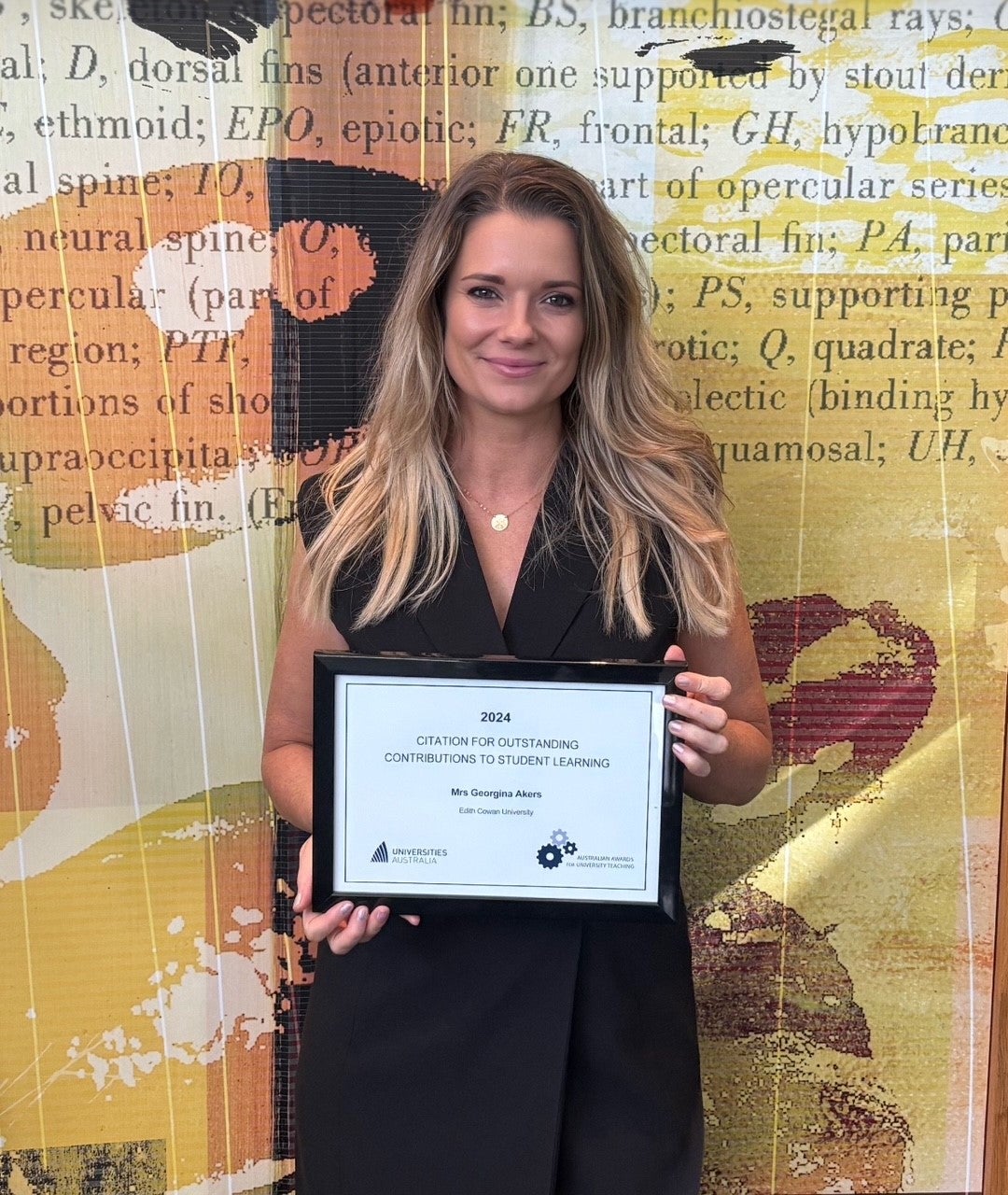
Meet the Mind Behind Our Master of Counselling Course
Our own Master of Counselling course coordinator, Georgina Akers, has been nationally recognised for her work in designing and facilitating this unique program.
We chatted with Georgina following her Australian Awards for University Teaching (AAUT) Citation for outstanding contribution to student learning, to find out what goes into creating an innovative and inclusive online course, and how she inspires a new generation of counsellors.

Why did you want to create an online Master of Counselling?
We designed this course in response to two parallel shifts in our field. First, the landscape of counselling itself is evolving – not all clients can or want to access traditional forms of in-person counselling practice and effective therapeutic relationships are increasingly being built through diverse modalities. Second, we recognised that higher education must adapt to meet students where they are. Many prospective students face barriers to on-campus attendance, whether due to geographical constraints, caring responsibilities, work commitments, or disability.
I'm extremely passionate about access, inclusion and social justice – these values sit at the heart of everything we've built. This course removes barriers while maintaining rigorous academic standards, opening pathways for people from diverse backgrounds and circumstances who will bring varied perspectives and lived experiences to the profession. When we're training counsellors who better reflect the communities they'll serve, everyone benefits.
This course is "person-centred". What does that mean for students?
Person-centred counselling is grounded in the fundamental belief that every person has the capacity for growth, healing and becoming more fully themselves when given the right conditions. The counsellor's role isn't to advise, assess, or diagnose, but to create the relational conditions in which the client's own capacity for healing can emerge. The client is recognised as the expert on their own life and experience.
The counsellor creates a therapeutic relationship characterised by three essential qualities: genuineness (being authentically themselves rather than hiding behind a professional façade), deep empathic understanding (accurately sensing the client's inner world) and unconditional positive regard (accepting the client completely, without conditions or judgment). Within this relationship, clients feel safe enough to explore parts of themselves they may have previously rejected or hidden. They begin to trust their own experiencing, to challenge the conditions imposed by others and to move towards becoming more fully themselves.
How has that informed the course design?
The person-centred approach isn't just what we teach – it's how we teach. Just as we trust clients to find their own direction, we trust students to develop their own authentic way of practicing.
We don't train students to become cookie-cutter versions of a particular therapeutic model. Instead, we expose them to multiple approaches – psychodynamic, behavioural, integrative – and give them the space to explore what genuinely fits with who they are and how they understand people. Through case studies, role plays and reflective work, students are constantly asking themselves: Does this make sense to me? Does this align with my values? Can I do this authentically?
This isn't about picking and choosing techniques based on what's easiest or most comfortable. Students need to understand the theory and evidence behind different approaches and develop a coherent framework that holds together. They're building a professional identity, not just collecting tools.
By the time they graduate, we aim for students to know why they work the way they do. They can draw on different approaches thoughtfully and intentionally, matching what they offer to what each client needs. They're not mimicking their lecturers or past theorists – they're becoming unique practitioners with their own clear therapeutic voice.
What will students learn when they study an online Master of Counselling at ECU?
Students graduate with a comprehensive understanding of counselling theory and practice that prepares them for the realities of contemporary therapeutic work.
Through theory and practice, students develop their own integrated, evidence-informed counselling philosophy. They learn to work in ways that honour cultural diversity and challenge the dominance of Western-centric models, becoming practitioners who can respond thoughtfully to clients from diverse backgrounds.
The curriculum is deliberately future-focused. Students develop competencies in digital service delivery, understanding both the opportunities and ethical considerations of online and telehealth counselling. They're prepared for a profession that increasingly operates across both physical and digital spaces.
Central to the course is the development of reflexive practice. Students engage deeply with self-awareness work, examining how their own values, biases and experiences shape the therapeutic relationship. This commitment to ongoing self-reflection becomes the foundation for ethical, culturally responsive practice throughout their careers.
Why should students consider the ECU Online Master of Counselling?
This course prepares students for counselling as it actually exists today – not just in traditional consulting rooms, but across telehealth platforms, community settings and emerging digital spaces. We've designed it to be responsive to where the profession is heading, while grounding students in robust theoretical foundations.
Flexible pathways
We offer two entry points. The Graduate Certificate suits people already working in helping professions – teachers, nurses, social workers, paramedics, youth workers – who want to enhance their relational and therapeutic skills within their current roles. It's a standalone qualification, but also provides a pathway into the full Master for those who want to become registered counsellors.
Contemporary, culturally responsive curriculum
The Master of Counselling is fully accredited and covers the skills contemporary practitioners actually need: working effectively online, trauma-informed approaches, counselling children and adolescents, and navigating the complexities of practice in culturally diverse contexts.
Cultural competence isn't treated as a standalone topic – it's embedded throughout the entire curriculum. While we do offer a dedicated unit on counselling at the cultural interface, developed in collaboration with Kurongkurl Katitjin (ECU's Centre for Indigenous Australian Education and Research), cultural awareness and reflexivity are intentionally woven through every unit. This approach ensures students develop the ongoing critical reflection and cultural humility necessary for ethical, culturally safe practice.
Real-world experience
Students first attend a compulsory 3-day in-person intensive workshop to practise and consolidate advanced skills, before completing 220 hours of professional placement in agency settings with real clients. These practical components are completed in Australia, under the guidance of qualified, clinical supervisors, ensuring students meet registration requirements and graduate genuinely ready for practice.
Many of our students are offered employment as a direct result of their placement experience, which is what the course is ultimately about – training the next generation of counselling professionals who will make a meaningful difference and help address mental health needs across Australia and beyond.
Who is the ECU Online Master of Counselling for?
This is a postgraduate course (AQF Level 9) designed for professionals ready to transition into counselling or deepen their therapeutic skills. Applicants need a bachelor's degree or equivalent, along with demonstrated experience using advanced communication and interpersonal skills in professional settings – whether that's in education, healthcare, social services, community work, or other helping professions.
We're looking for people who understand the responsibility that comes with this work. Counsellors hold space for others' grief, trauma and most vulnerable experiences. This isn't a career for everyone and we want students who will approach it with maturity, self-awareness and genuine commitment to supporting others.
A foundation for lifelong practice
This course provides comprehensive preparation for professional practice and meets the requirements for Level 2 registration with the Australian Counselling Association. However, we're clear with students that graduation is the beginning of their professional journey, not the end. The course establishes solid theoretical and practical foundations while instilling the commitment to ongoing supervision, professional development and reflective practice that the profession requires. Ethical counsellors are lifelong learners – this course launches that trajectory.
How can future counsellors get started with ECU Online?
The Master of Counselling at ECU Online is designed for flexibility. It’s delivered in an accelerated format, so students graduate with job-ready skills – and start changing lives – sooner than at many other universities.
If you’re interested in joining us, we would love to meet you! You can learn more and download a course guide on our website, or you can book a call with our Student Enrolment Advisors to discuss your options and future career.



